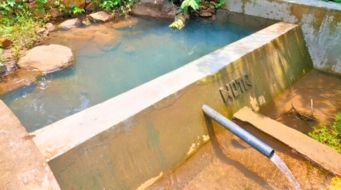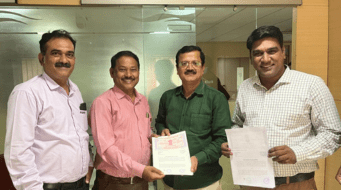By Prithviraj Gaikwad & Harshal Khade
Photos: Prithviraj Gaikwad, Gopal Thakur, Vijay Khandare, Aneeram, Venkat Reddy, Boya Govind, Vijay Bhaskar, Nakka Dasharath
Neam Kunti Pedha Bemanna in his SCI red gram plot at Abhangapur / Photo by Nakkadasharath
In India, the kharif season begins with the onset of the southwest monsoon in the month of June. India receives the major chunk of the annual rainfall during June to September.
Here are snapshots of WOTR’s field teams providing training to the farmers on the key measures to be taken while preparing for agricultural activities this kharif.
System of Crop Intensification (SCI)
SCI is a systematic approach involving use of organic fertilisers and low external inputs to ensure high agriculture productivity. It involves soil preparation and management, crop spacing, integrated nutrient management, integrated pest management and irrigation management.
System of Rice Intensification (SRI)
 SRI demo plot of Sailu in Perapalla village, Narayanpet, Telangana / Photo by Aneeram
SRI demo plot of Sailu in Perapalla village, Narayanpet, Telangana / Photo by Aneeram
Pre-kharif training
 A training in progress in Jafrabad block, Jalna, Maharashtra
A training in progress in Jafrabad block, Jalna, Maharashtra
Land preparation
Land preparation is an important activity which improves soil, water and air conditions for the desired crop.
 Land preparation underway in Rajur
Land preparation underway in Rajur
Green manure seed distribution
Green manuring crops like dhaincha helps to enrich the soil with biomass. It will also help farmers to reduce input costs and increase yield.
 Green manure seed distribution at Bommanpad village, Telangana, along with the Sarpanch / Photo by Venkat Reddy
Green manure seed distribution at Bommanpad village, Telangana, along with the Sarpanch / Photo by Venkat Reddy
 M Siddappa manually broadcasting green manure seeds in Ammireddypally village Telangana / Photo by Boya Govind
M Siddappa manually broadcasting green manure seeds in Ammireddypally village Telangana / Photo by Boya Govind
Sowing
There are different methods of sowing seeds: broadcasting, drilling, row planting and transplanting to name a few.
 Kumari Chenappa sowing red gram seeds at Kotakonda village, Narayanpet, Telangana / Photo by Venkat Reddy
Kumari Chenappa sowing red gram seeds at Kotakonda village, Narayanpet, Telangana / Photo by Venkat Reddy

Seed treatment
WOTR distributed seed treatment materials — PSB 25 gm/kg, Azotobactor 25 gm/kg and Rhizobium 25 gm/kg. Seed treatment protects germinating seeds and seedlings from harmful microbes in the soil. It also helps in early and uniform growth. Farmers were also provided green manure which will be directly used without composting.
 Seed treatment being done in Parner / Photo by Lomeshwar Jori
Seed treatment being done in Parner / Photo by Lomeshwar Jori
 Trichoderma powder – biocontrol agent used for controlling soil-borne diseases – mixed with red gram seeds at Shernapally, Narayanpet, Telangana / Photo by Vijay Bhaskar
Trichoderma powder – biocontrol agent used for controlling soil-borne diseases – mixed with red gram seeds at Shernapally, Narayanpet, Telangana / Photo by Vijay Bhaskar
 SRI transportation begins in Lingampally village
SRI transportation begins in Lingampally village
Farmer Field Schools and agriculture demonstrations
FFS is an effort towards bringing new technological advances in organic and climate-resilient agricultural practices at the village-level. It aims to achieve maximum yield with minimum expense to farmers, while also keeping in mind the long term sustainability of their lands. WOTR also conducts agriculture demonstrations pre-kharif for crops such as paddy, green gram, soybean, cotton, etc.

Online workshops
Over 1,300 community members from 294 villages of seven states participated in interactive workshops that provided a snapshot of the situation in the villages. This helped enhance their understanding and knowledge of COVID-19 regulations.

Promotion of organic formulations
Women in Maharashtra’s Jalna are preparing Dashparni Ark – an organic pest control concoction. The application of this organic pesticide reduces input costs and is environment-friendly. Methods like applying Dashaparni Ark play a major role in organic farming.

Promotion of composting
WOTR has supported farmers for the preparation of compost by different methods such as vermicomposting (tetrabeds), low-cost vermicomposting, NADEP method of composting, composting using waste decomposer culture, etc.

Soil testing
WOTR has provided training to farmers to collect soil samples for testing. These samples have been analysed in the laboratory (external lab) and the results are shared with farmers.
Mulching
Mulch is applied to retain soil moisture and improve soil health.

Promotion of light trap as an integrated pest management tool
Training and support for implementing the light trap method to curb the menace of major pests such as the white grub, have been provided to famers.
Agro advisories through SMS
Crop-specific, locale-specific agro advisories are being sent to farmers on their mobile phones.
Installation of raingauge in Gangapur / WOTR is promoting low-cost micro-irrigation system like Rain Irrigation system on 5 acres of land owned by 5 farmers.



Multilayer farming
Multilayer farming initiative is being promoted to address insufficient food and inadequate nutrition for families in the face of the climate crisis, and to help rural households to be self-reliant and resilient. In Karjat cluster, Ahmednagar district, Maharashtra, some farmers are willing to take up multilayer farming on 2R, 5R and even 10R.
 A multilayer farm in Rajur, Jalna, Maharashtra
A multilayer farm in Rajur, Jalna, Maharashtra
Activities in a nutshell
In four districts of Maharashtra, different activities are benefitting farmers this Kharif season:
386 System of Crop Intensification (SCI) demos, 1,442 Farmer Field Schools (FFS), 1,375 Soil tests and soil health cards, 64 Crop Residue Mulching, 1,335 intercroppings, 5,740 Trap crops, 7,282 agromet advisories, 3,272 seed treatments, 623 composting pits, 1,006 light traps, 1,739 yellow sticky traps, 1,940 organic formulations, 23 green manurings, 1,953 pheromone traps, 752 vermicompost pits, 164 NADEPs, 174 plastic sheet mulchings, 354 multilayer farms and 150 crop planning sessions.






